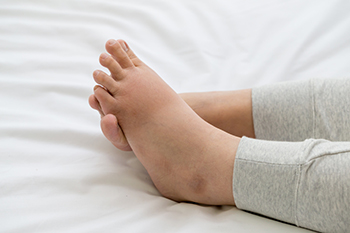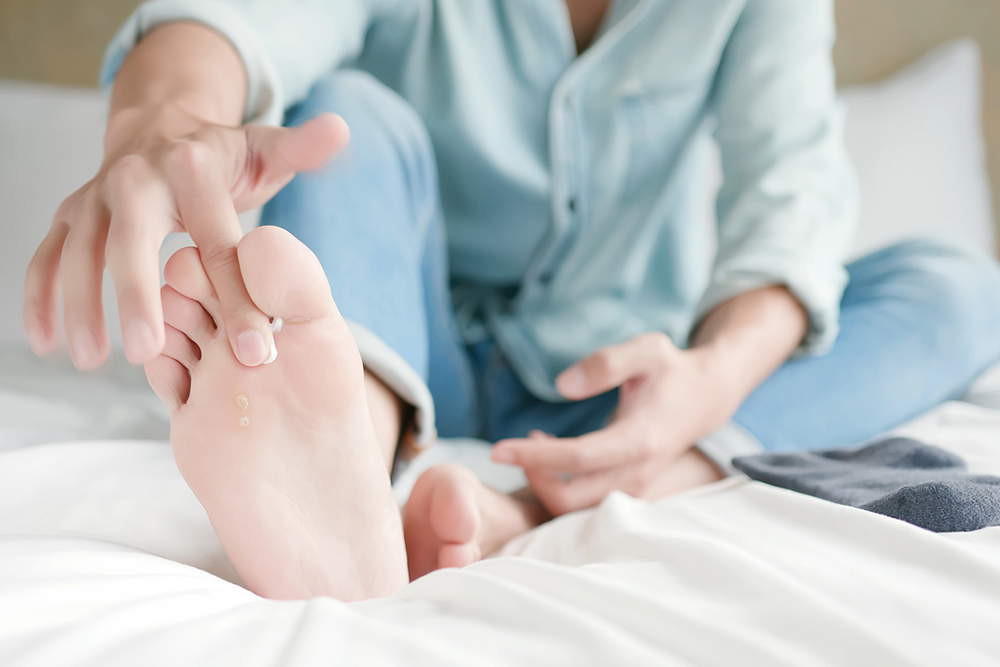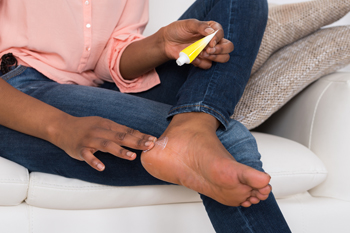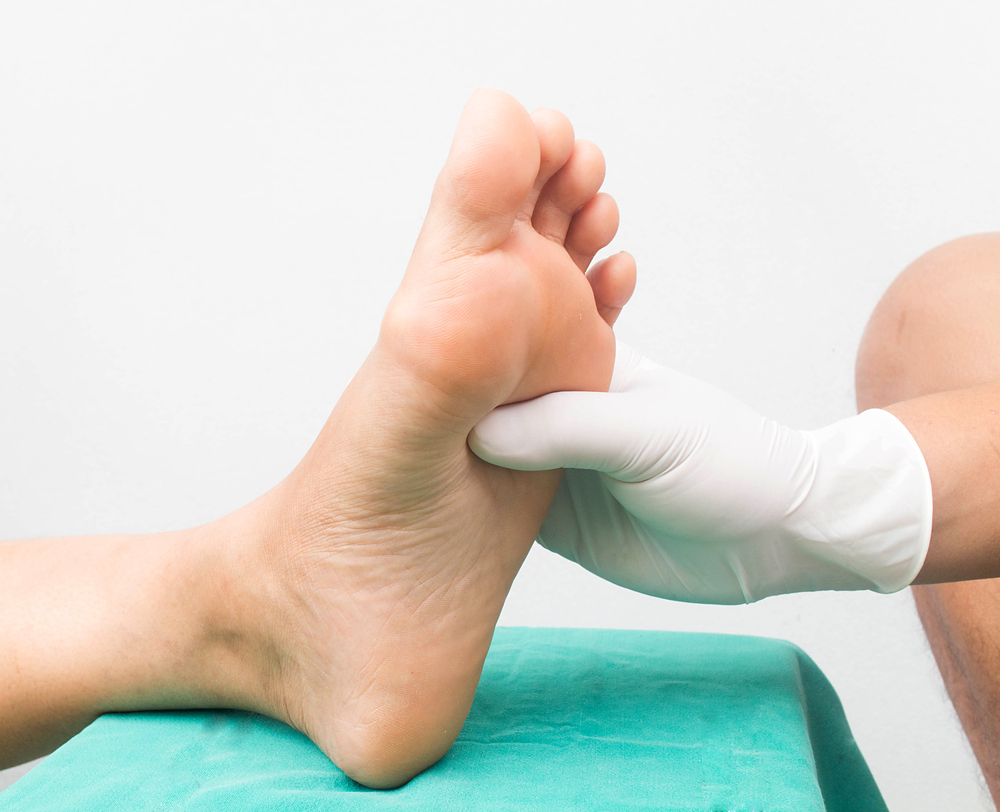 The entire body changes during pregnancy, and the feet are no exception. Many women notice their feet have grown, which may be attributed to pregnancy hormones the body produces. As the pregnancy progresses, the feet may become swollen, and the arches may flatten as additional weight is gained. Relief may be found when shoes that are worn have a low heel and healthy foods are consumed. It is helpful to refrain from eating salty foods, and frequently elevating the feet may reduce the swelling. Swollen feet may also be a symptom of poor circulation, which may happen from the body recirculating extra fluid that is needed by the growing fetus. It is beneficial to stay as active as possible, drink plenty of water daily, and sleep on the left side. If you have additional questions about how pregnancy can affect the feet, it is suggested that you consult with a podiatrist who can address any concerns you may have.
The entire body changes during pregnancy, and the feet are no exception. Many women notice their feet have grown, which may be attributed to pregnancy hormones the body produces. As the pregnancy progresses, the feet may become swollen, and the arches may flatten as additional weight is gained. Relief may be found when shoes that are worn have a low heel and healthy foods are consumed. It is helpful to refrain from eating salty foods, and frequently elevating the feet may reduce the swelling. Swollen feet may also be a symptom of poor circulation, which may happen from the body recirculating extra fluid that is needed by the growing fetus. It is beneficial to stay as active as possible, drink plenty of water daily, and sleep on the left side. If you have additional questions about how pregnancy can affect the feet, it is suggested that you consult with a podiatrist who can address any concerns you may have.
Pregnant women with swollen feet can be treated with a variety of different methods that are readily available. For more information about other cures for swollen feet during pregnancy, consult with Brent Harwood, DPM from Southeast Podiatry. Our doctor will attend to all of your podiatric needs.
What Foot Problems Can Arise During Pregnancy?
One problem that can occur is overpronation, which occurs when the arch of the foot flattens and tends to roll inward. This can cause pain and discomfort in your heels while you’re walking or even just standing up, trying to support your baby.
Another problem is edema, or swelling in the extremities. This often affects the feet during pregnancy but tends to occur in the later stages.
How Can I Keep My Feet Healthy During Pregnancy?
If you have any questions please feel free to contact our offices located in Fairhope, Brewton, and Atmore, AL. We offer the newest diagnostic and treatment technologies for all your podiatric needs.
Many pregnant women complain about foot pain while they are expecting. Foot pain can primarily be caused by weight gain and hormonal changes taking place in the body. By understanding how pregnancy impacts the health of a woman's feet, a pregnant woman can take action to keep her feet as healthy and comfortable as possible.
Because a woman's weight changes during pregnancy, more pressure is brought to bear on both the legs and the feet. This weight shift can cause two major foot problems: over-pronation, also known as flat feet, as well as edema, which is swelling of the feet. Over-pronation occurs when the arch of the foot flattens, causing the foot to roll inwards when the individual is walking, and can aggravate the plantar fascia tissues located along the bottom of the feet. If these tissues become inflamed, a pregnant woman can experience pain in the heel of the foot as well as severe foot pain while walking or standing. Swelling of the feet, or edema, often occurs in the later stages of pregnancy. It is caused by slow circulation and water retention, and may turn the feet a light purple color.
To keep feet in good health and prevent over-pronation, pregnant women should avoid walking barefoot and be sure they are wearing shoes that offer good arch support. A device known as an orthotic can be added to regular footwear in order to provide additional support for the feet during pregnancy. Any expectant mother whose feet hurt should first check to see if the shoes she is wearing are old, worn out and not offering the proper support necessary for distributing the weight of her body during pregnancy.
To treat edema of the feet, a good start is to wear quality footwear which offers support and good circulation. Keep feet elevated whenever possible by using a foot stool while seated. Stay well hydrated by drinking plenty of water to prevent water retention in the feet. Any swelling that occurs in only one foot should be examined as soon as possible by a doctor.
Good foot health during pregnancy can help expectant mothers avoid foot pain that leads to other health problems. Massaging the feet and doing regular gentle exercise like walking aids foot health by contributing to good circulation. Supportive shoes are also a good investment that will support foot health during pregnancy.
 Athlete's foot is a particular foot condition that is essentially a fungal infection. Caused by a fungus, athlete's foot is characterized by scaly skin texture and redness. Many patients often wonder who can develop athlete's foot. The answer is that athlete’s foot can develop in someone regardless of their age, sex, or race. Importantly, there are certain things that can make an individual more susceptible to developing athlete’s foot. For example, if you are someone that spends a significant amount of time not wearing shoes in warm, moist, public areas, then you might be at a higher risk of developing athlete’s foot. To learn more about this condition and receive any treatment that might be necessary, it is suggested that you contact a podiatrist today.
Athlete's foot is a particular foot condition that is essentially a fungal infection. Caused by a fungus, athlete's foot is characterized by scaly skin texture and redness. Many patients often wonder who can develop athlete's foot. The answer is that athlete’s foot can develop in someone regardless of their age, sex, or race. Importantly, there are certain things that can make an individual more susceptible to developing athlete’s foot. For example, if you are someone that spends a significant amount of time not wearing shoes in warm, moist, public areas, then you might be at a higher risk of developing athlete’s foot. To learn more about this condition and receive any treatment that might be necessary, it is suggested that you contact a podiatrist today.
Athlete’s foot is an inconvenient condition that can be easily reduced with the proper treatment. If you have any concerns about your feet, contact Brent Harwood, DPM from Southeast Podiatry. Our doctor will treat your podiatric needs.
Athlete’s Foot: The Sole Story
Athlete's foot, also known as tinea pedis, can be an extremely contagious foot infection. It is commonly contracted in public changing areas and bathrooms, dormitory-style living quarters, around locker rooms and public swimming pools, or anywhere your feet often come into contact with other people.
Solutions to Combat Athlete’s Foot
Athlete’s foot can cause many irritating symptoms such as dry and flaking skin, itching, and redness. Some more severe symptoms can include bleeding and cracked skin, intense itching and burning, and even pain when walking. In the worst cases, Athlete’s foot can cause blistering as well. Speak to your podiatrist for a better understanding of the different causes of Athlete’s foot, as well as help in determining which treatment options are best for you.
If you have any questions please feel free to contact our offices located in Fairhope, Brewton, and Atmore, AL. We offer the newest diagnostic and treatment technologies for all your podiatric needs.
Athlete’s foot is an extremely contagious infection caused by a fungus that results in itching, burning, dry, and flaking feet. The fungus that causes athlete’s foot is known as tinea pedis and thrives in moist, dark areas such as shower floors, gyms, socks and shoes, commons areas, public changing areas, bathrooms, dormitory-style houses, locker rooms, and public swimming pools. Athlete’s foot is difficult to treat as well because of the highly contagious and recurrent nature of the fungus.
Tinea is the same fungus that causes ringworm, and is spread by direct contact with an infected body part, contaminated clothing, or by touching other objects and body parts that have been exposed to the fungus. Because the feet are an ideal place for tinea to grow and spread, this is the most commonly affected area. It is, however, known to grow in other places. The term athlete’s foot describes tinea that grows strictly on the feet.
The most commonly infected body parts are the hands, groin, and scalp, as well as the feet. Around 70% of the population suffer from tinea infections at some point in their lives, however, not all of these cases are athlete’s foot. Just like any other ailment, some people are more likely to get it than others, such as people with a history of tinea infections or other skin infections, both recurring and non-recurring ones. The extent to which a person experiences regrowth and recurrent tinea infections varies from person to person.
Sometimes people will not even know that they are infected with tinea or that they have athlete’s foot because of a lack of symptoms. However, most experience mild to moderate flaking, itching, redness, and burning. However, some of the more severe symptoms include cracking and bleeding skin, intense itching and burning, pain while walking or standing, and even blistering.
Because of the recurring nature of the tinea fungus and the athlete’s foot it causes, the best way to treat this condition is with prevention. You can take some preventative measures such as wearing flip-flops or sandals in locker rooms and public showers to reduce contact with the floor. It also helps to keep clean, dry feet while allowing them to breathe. Using powders to keep your feet dry is a good idea, as well as keeping your feet exposed to light and cool air, to prevent the growth of tinea. If you do happen to get athlete’s foot, opt for using topical medicated creams, ointments, or sprays. These treatments help eliminate and prevent it from coming back.
 Cracked heels is a foot condition that is more common than many people think. It can happen for various reasons, such as wearing shoes that do not fit correctly and drinking inadequate amounts of water daily. Walking barefoot, in addition to frequently wearing flip-flops or other open-back shoes, may also lead to developing cracked heels. Existing medical conditions, consisting of diabetes, psoriasis, or athlete’s foot, may lead to getting this condition. Obesity may be a reason cracked heels can develop, which can be a result of added weight the body must bear. This is also true of pregnancy, causing cracked heels and swollen feet to happen. Research has shown there may be nutritional deficiencies that can cause this uncomfortable condition, including calcium, iron, and vitamin E. Mild relief may be found when the feet are soaked in warm water, followed by applying a good moisturizer. If you would like additional relief options for cracked heels, it is suggested that you confer with a podiatrist who can answer any questions you may have.
Cracked heels is a foot condition that is more common than many people think. It can happen for various reasons, such as wearing shoes that do not fit correctly and drinking inadequate amounts of water daily. Walking barefoot, in addition to frequently wearing flip-flops or other open-back shoes, may also lead to developing cracked heels. Existing medical conditions, consisting of diabetes, psoriasis, or athlete’s foot, may lead to getting this condition. Obesity may be a reason cracked heels can develop, which can be a result of added weight the body must bear. This is also true of pregnancy, causing cracked heels and swollen feet to happen. Research has shown there may be nutritional deficiencies that can cause this uncomfortable condition, including calcium, iron, and vitamin E. Mild relief may be found when the feet are soaked in warm water, followed by applying a good moisturizer. If you would like additional relief options for cracked heels, it is suggested that you confer with a podiatrist who can answer any questions you may have.
Cracked heels are unsightly and can cause further damage to your shoes and feet. If you have any concerns, contact Brent Harwood, DPM from Southeast Podiatry. Our doctor can provide the care you need to keep you pain-free and on your feet.
Cracked Heels
Cracked heels appear unappealing and can make it harder for you walk around in sandals. Aside from looking unpleasant, cracked heels can also tear stockings, socks, and wear out your shoes. There are several methods to help restore a cracked heel and prevent further damage.
How Do You Get Them?
Dry skin is the number one culprit in creating cracked heels. Many athletes, walkers, joggers, and even swimmers suffer from cracked heels. Age and skin oil production play a role to getting cracked heels as well.
Promote Healing
Over-the-counter medicines can help, especially for those that need instant relief or who suffer from chronic dry feet.
Wear Socks – Wearing socks with medicated creams helps lock in moisture.
Moisturizers – Applying both day and night will help alleviate dryness which causes cracking.
Pumice Stones – These exfoliate and remove dead skin, which allows for smoother moisturizer application and better absorption into the skin.
Change in Diet
Eating healthy with a well-balanced diet will give the skin a fresh and radiant look. Your body responds to the kinds of food you ingest. Omega-3 fatty acids and zinc supplements can also revitalize skin tissue.
Most importantly, seek professional help if unsure how to proceed in treating cracked heels. A podiatrist will help you with any questions or information needed.
If you have any questions please feel free to contact our offices located in Fairhope, Brewton, and Atmore, AL. We offer the newest diagnostic and treatment technologies for all your podiatric needs.
Cracked heels may make you want to think twice about showing off your feet in warmer weather. However, cracked heels may be harmful to more than just the appearance of your feet. If deep fissures and cracks develop in your heels, they may make walking and standing painful for you. Additionally, these openings make way for germs to enter through your skin and cause infection.
There are several different causes of cracked heels. One of the most common reasons for this ailment is dry skin. This problem may make your keeps feel rough tight and itchy. Dry skin may be caused by cold air, extremely hot water, harsh soaps, and aging. Skin disorders such as eczema and psoriasis may eventually lead to dry skin. In some cases, complications may arise from cracked heels. Some of these complications are a loss of feeling in the heel, cellulitis, or a diabetic foot ulcer.
There are ways you can try to prevent getting cracked heels. One of the best ways to do so is to avoid wearing flip-flops and sandals because these shoes increase your risk of drying out your feet. You should also avoid wearing shoes with a tall skinny heel, because these shoes cause your heel to expand sideways. At night, you should slather a thick moisturizing cream on your feet and then cover them in socks to keep your feet moisturized overnight. Drinking water to stay hydrated is also a good way to ensure that your skin doesn’t become dry.
If you suffer from a severe case of cracked feet, you should make an appointment with your podiatrist to see what treatment methods are best for you.
 Diabetes is a serious health condition that may eventually affect the feet. It is a common occurrence among diabetic patients, and keeping a close eye on blood sugar levels may help to prevent diabetic foot ulcers. People who have diabetes may be prone to developing neuropathy, which is nerve damage that is caused by high sugar levels. This can cause the inability to feel existing cuts, bruises, or scrapes that have developed, increasing the importance of performing daily self-examinations. This can be done by using a mirror to detect small cuts, or an available family member or caregiver may be able to assist with this. Diabetic foot care consists of trimming the toenails weekly and washing and drying the feet thoroughly. It is beneficial to refrain from participating in activities that can injure the feet, in addition to wearing shoes and socks that fit correctly. The risk of developing foot conditions may be reduced when glucose levels are controlled by being closely monitored. If you have diabetes, it is strongly suggested that you are under the care of a podiatrist who can help you to manage this condition.
Diabetes is a serious health condition that may eventually affect the feet. It is a common occurrence among diabetic patients, and keeping a close eye on blood sugar levels may help to prevent diabetic foot ulcers. People who have diabetes may be prone to developing neuropathy, which is nerve damage that is caused by high sugar levels. This can cause the inability to feel existing cuts, bruises, or scrapes that have developed, increasing the importance of performing daily self-examinations. This can be done by using a mirror to detect small cuts, or an available family member or caregiver may be able to assist with this. Diabetic foot care consists of trimming the toenails weekly and washing and drying the feet thoroughly. It is beneficial to refrain from participating in activities that can injure the feet, in addition to wearing shoes and socks that fit correctly. The risk of developing foot conditions may be reduced when glucose levels are controlled by being closely monitored. If you have diabetes, it is strongly suggested that you are under the care of a podiatrist who can help you to manage this condition.
Diabetic foot care is important in preventing foot ailments such as ulcers. If you are suffering from diabetes or have any other concerns about your feet, contact Brent Harwood, DPM from Southeast Podiatry. Our doctor can provide the care you need to keep you pain-free and on your feet.
Diabetic Foot Care
Diabetes affects millions of people every year. The condition can damage blood vessels in many parts of the body, especially the feet. Because of this, taking care of your feet is essential if you have diabetes, and having a podiatrist help monitor your foot health is highly recommended.
The Importance of Caring for Your Feet
Patients with diabetes should have their doctor monitor their blood levels, as blood sugar levels play such a huge role in diabetic care. Monitoring these levels on a regular basis is highly advised.
It is always best to inform your healthcare professional of any concerns you may have regarding your feet, especially for diabetic patients. Early treatment and routine foot examinations are keys to maintaining proper health, especially because severe complications can arise if proper treatment is not applied.
If you have any questions please feel free to contact our offices located in Fairhope, Brewton, and Atmore, AL. We offer the newest diagnostic and treatment technologies for all your podiatric needs.